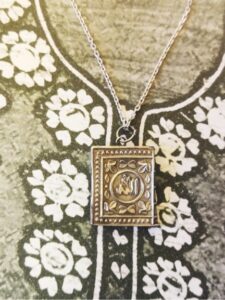Karima Brooke

‘I have no desire to make windows
into men’s souls’.
The judge echoed the queen, conscious
of irony and the risk of own goals.
In her domain, rhetoric flows.
‘We’ll pray for him; tell us his name’.
It’s no secret.
Though tribunals are closed studios,
with appellants rarely touched by fame.
Maybe like Pontius
Pilate, hers is a secular mindset
presiding over a populist game.
I touch the amulet hidden near my breast bone,
see myself kneeling, call on the Holy Name.
He won humanitarian protection,
Article 8, Sub-section…
Also allowed was that day’s earlier claim.
An orphan trafficked,
bought by ‘aunty’, sold on as a slave,
He cried out but no-one came.
No-one noticed- hard to believe.
Boxes ticked.
‘Prayers granted’ was sent as emojis by phone
from missionary friends: ‘It shows
how God alone
is merciful and truly knows
what’s in men’s hearts’.
We all have roles
More or less original, all mimicked.
Much depends on the court district.
We play our respective parts.
Though we rejoice,
what’s the fate of those without an advocate?
no supporting voices,
no-one able to translate?
How then does the petitioned God make choices?
Background to my poem, The Amulet
Karima Brooke
This poem relates to a real immigration appeal hearing, a third and final appeal for asylum, at which I was a witness in November 2022.
The man appealing, MF, had been our guest under the Sanctuary Hosting scheme in 2018 to 2019. He was claiming asylum on the grounds of his conversion to Christianity – which could potentially mean a death sentence were he to be returned to Iran as he would be seen as an ‘apostate’. Because of the backlog in the asylum system, this final appeal – which was heard by a judge – had been postponed many times. I and the other witness for MF, his vicar in the city where he now lives were allowed to be present remotely, as were the interpreter and the presenting officer for the Home Office. The judge, MF, his barrister and the tribunal official were physically present.
My testimony was basically that, whilst he was living with us, I had observed him to be a practicing, committed Christian. I had given him a Bible in Farsi as a Christmas present, and he was very grateful for this.
Everything in this poem actually happened:
- The judge, in her opening remarks, really did quote Elizabeth I
- Friends of mine who are evangelical Christians and very involved with Iranian converts to Christianity, did say, when I told them about the forthcoming case ‘Tell us his name and we’ll pray for him and ask others to pray for him’
- The same people, when I told them the good news of MF’s success, did send an emoji showing Prayers Granted=
- And, more or less, this is what my friends said when we next met
- A case which was heard simply to give the decision, was slotted in earlier and either I was allowed to stay – or they had forgotten that I was there remotely. This was the case of the Chinese teenager who was a victim of modern slavery.
As to the poem, it is quite deliberately modelled on George Herbert’s poem The Collar. It has the same, very complicated rhyming scheme of 11 rhymes, similar line lengths, and absence of a consistent metre. It also has a title of something physical, worn on the body that is symbolical: the collar of obedience, the amulet of asking God’s protection against evil. Both concern theological issues – Herbert is struggling with obedience, and me with the concept of intercession. Herbert seems to resolve his issue by the end of his poem; but I’m left with even more questions.
| Previous Article | Next Article |
Back to February 2023 Newsletter Main Page
Forty-Three Newsletter • Number 526 • February 2023
Oxford Friends Meeting
43 St Giles, Oxford OX1 3LW
Copyright 2023, Oxford Quakers
